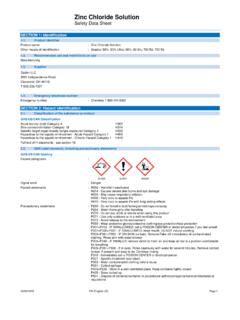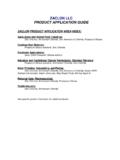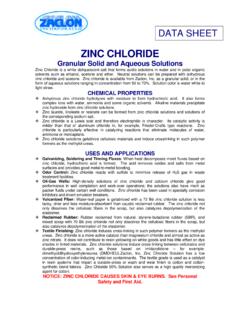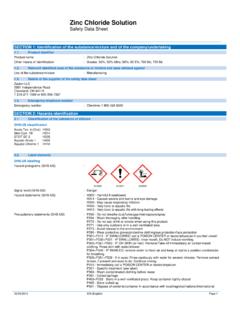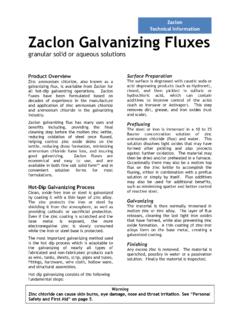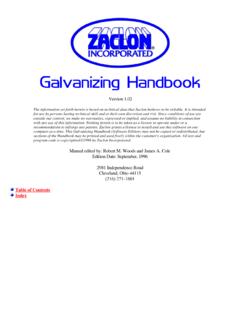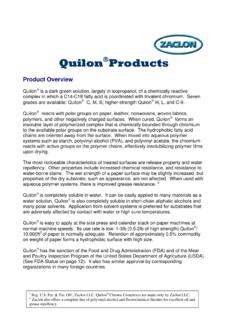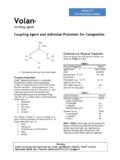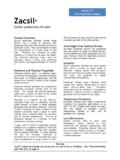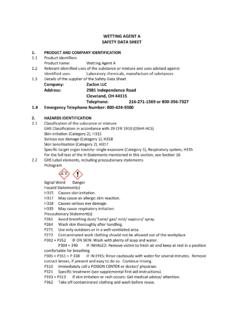Transcription of Technical Information Zinc Chloride
1 zinc Chloride granular solid or aqueous solutions Product Overview zinc Chloride is a white deliquescent salt that forms acidic solutions in water and in polar organic solvents such as ethanol, acetone and ether. Neutral solutions can be prepared with anhydrous zinc Chloride and acetone. zinc Chloride is available from Zaclon LLC as a granular solid or in the form of aqueous solutions ranging in concentration from 50 to 70%. Solution is a light straw color. Chemical and Physical Properties Anhydrous zinc Chloride hydrolyzes with moisture to form hydrochloric acid. It also forms complex ions with water, ammonia and some organic solvents.
2 Alkaline materials precipitate zinc hydroxide from zinc Chloride solutions. zinc laurate, linoleate or resinate can be formed from zinc Chloride solutions and solutions of the corresponding sodium salt. zinc Chloride is a Lewis acid and therefore electrophilic in character. Its catalytic activity is milder than that of aluminum Chloride in, for example, Friedel-Crafts type reactions. zinc Chloride is particularly effective in catalyzing reactions that eliminate molecules of water, ammonia or mercaptans. zinc Chloride solutions gelatinize cellulosic materials and induce crosslinking in such polymer formers as the methylol ureas.
3 zinc Chloride solution has no USP designation, though the purity of Zaclon zinc Chloride solutions can match anything made from USP-grade dry zinc Chloride solution. Uses and Applications Galvanizing, Soldering and Tinning Fluxes When heat decomposes moist fluxes based on zinc Chloride , hydrochloric acid is formed. The acid removes oxides and salts from metal surfaces and provides good metal-to-metal bonding. Odor Control zinc Chloride reacts with sulfide to minimize release of H2S gas in waste treatment facilities. Oil-Gas Wells High-density solutions of zinc Chloride and calcium Chloride give good performance in well completion and work-over operations; the solutions also have merit as packer fluids under certain well conditions.
4 zinc Chloride has been used in specialty corrosion inhibitors and invert emulsion breakers. Vulcanized Fiber Water-leaf paper is gelatinized with a 72 B zinc Chloride solution is less tacky, drier and less moisture-absorbent than caustic reclaimed rubber. The zinc Chloride not only dissolves the cellulosic fibers in the scrap, but also catalyzes depolymerization of the elastomer. Organic Syntheses zinc Chloride absorbs readily on charcoal or silica for catalyzing acylations and alkylations by Friedel-Crafts synthesis. In esterifications and condensation reactions, zinc Chloride facilitates the elimination of water or ammonia molecules from the reactants. One example is the Fischer idole synthesis.
5 Zaclon LLC Technical Information Warning zinc Chloride can cause skin burns, eye damage, nose and throat irritation. See Personal Safety and First Aid on page 3. Reclaimed Rubber Rubber reclaimed from natural, styrene-butadiene rubber (SBR), and mixed scrap with 70 B zinc Chloride not only dissolves the cellulosic fibers in the scrap, but also catalyzes depolymerization of the elastomer. Liquid Fertilizer zinc Chloride may be used with chelating agents for a micronutrient in liquid fertilizers. Textile Finishing zinc Chloride induces cross-linking in such polymer formers as the methylol ureas. zinc Chloride is a more active catalyst than magnesium Chloride and almost as active as zinc nitrate.
6 It does not contribute to resin yellowing on white goods and has little effect on dye shades in tinted materials. zinc Chloride solutions induce cross-linking between cellulosics and durable-press resins, such as those based on imidazolidone, such as dimethyoldihydroxyethyleneurea (DMDHEU). Zaclon zinc Chloride solution has a low concentration of color-inducing metal-ion contaminants. The textile grade is used as a catalyst in resin systems that impart a durable-press or wash and wear finish to cotton and cotton-synthetic blend fabrics. zinc Chloride 50% solution also serves as a high quality mercerizing agent for cotton. Dry Cell Batteries zinc Chloride acts as moisture absorbent for the ammonium Chloride electrolyte and as corrosion retardant for the cathodic zinc casing.
7 Solution Grades Standard Grade Solution Zaclon zinc Chloride solution is available in a variety of standard solutions. The standard strengths are 50%, , , and See the table below for properties of these grades. Technical Grade Solution This grade is not as pure as our standard grades, but is more cost effective and compatible with certain uses. Its properties are similar to the standard grade except for the following differences. It may contain up to iron, up to of fluorides and up to TOC. Custom zinc Chloride Solution Zaclon offers a wide range of zinc Chloride based products, but is also willing to consider your individual needs and custom produce product with unique strengths, purity requirements, additives or other chemical components.
8 Standard zinc Chloride Solution Properties Standard Grades Properties 50% Gravity, Baume unites, 16O C (60O F) ( lb/gal) (15 lb/gal) ( lb/gal) ( lb/gal) ZnCl2 % Min Sulfates as SO3 Total iron as Fe % NH4Cl % Calcium as CaCl2 % Manganese as Mn % Clarity Clear Clear Clear Clear Color Light Straw Light Straw Light Straw Light Straw Basicity as ZnO % - Alkali-chlorides % No test No test No test TOC Negligible Negligible Total Heavy Metals (Cb, Pb, Cu) % zinc Chloride Granular Properties zinc Chloride (ZnCl2) water soluble % > minimum Ammonium (NH4) % maximum Water insoluble matter (basic zinc Chloride ) as ZnO % Total iron as Fe % maximum Total heavy metals (Cd, Pb) % maximum Color White Molecular weight Melting Point 287O C (549O F) Boiling Point 760 mm Hg ( kPa) 732O C (1350O F) Density 25O C (77O F) g/cm3 (Mg/m3) (180 lb/ft3) Solubility in water 25O C (77O F) g/100 g solution 81 Product Bulk Density Lb/ft3 100 loose (110 packed) Storage and Handling Metal drums of granular zinc Chloride should be stored, tightly closed, in a warm 10-24 oC (50-75 oF) dry place, protected from direct sunlight.
9 Because anhydrous zinc Chloride readily absorbs moisture, an inventory turnover rate of about 2-3 months is recommended to minimize the possibility of caking. Drums of zinc Chloride solutions should be stored with the bung at the top to minimize leakage, and drums should never be emptied by air pressure. Heated storage may be necessary for 70 Baume Technical and 72 Baume Technical zinc Chloride solutions to avoid freezing. These grades are also shipped in insulated tank cars equipped with steam coils. If the load freezes in transit, it can be thawed by connecting the plant steam line to the tank car coils. Freezing and thawing will not affect product quality.
10 Caution should be exercised in selecting materials for use with zinc chlorides. Steel tanks are not satisfactory for storage of zinc Chloride solutions. For storage at normal temperatures, rubber-lined steel tanks or fiberglass-reinforced polyester tanks are recommended. Small polyethylene or polypropylene tanks can also be used. Personal Safety and First Aid Health Hazards zinc Chloride is an acidic material and causes skin and eye burns. The principal hazard is to the eye, since even brief contact with zinc Chloride in water may produce permanent damage. Deaths, in which severe damage occurred to the esophagus and pylorus, have been known to occur from swallowing zinc Chloride .
